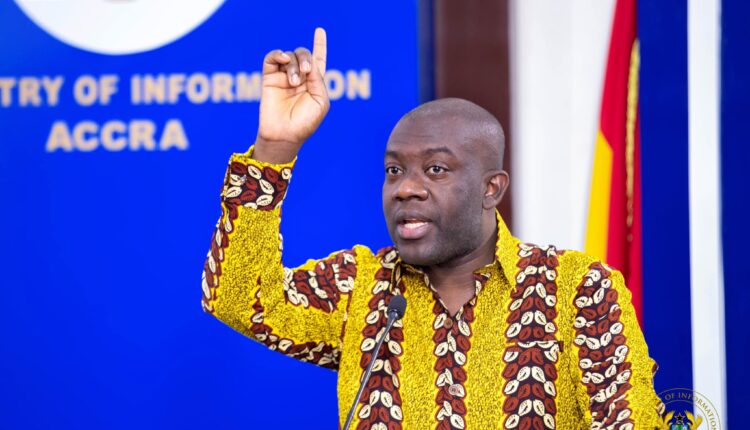Oppong-Nkrumah warns Ghanaian public to be alert to terror threats
The Minister of Information, Kojo Oppong-Nkrumah, has called on Ghanaians to remain alert to terror threats posed to the citizenry due to instabilities in Ghana’s neighbouring countries.
The minister was speaking in a radio interview on the morning of Monday, July 19, about the state of security in Ghana.
Oppong-Nkrumah was particularly emphatic about the role of informal service providers such as market women and commercial bus drivers in this process. The minister said he would like to see these categories of people report suspicious characters they encounter.
The minister’s caution comes on the back of weeks-old reports that circulated about bandits and rebel fighters in Burkina Faso making their way into mainland Ghana through the northern border.
Oppong-Nkrumah also spoke to the known practice of rebels recruiting fighters among disillusioned youths, especially young men.
“The general public must be reminded of the need to be vigilant and aware of the threat that is at hand. If a Ghanaian citizen sees [anything of suspicion] or sees a person mobilising young men in an area supposedly for them to go to Mali or Niger to go work in mines, the citizen should make sure the security agencies know,” the minister told Captain Smart of Onua TV.
He also mentioned other terrorist threats that did not lay on land but at sea.
“The Gulf of Guinea is the most treacherous waters now. We used to think it was Somalia [Gulf of Aden] in the Horn of Africa. Now, the threat of terrorism is close [to Ghanaians]”.
Ghana among neighbours
Ghana is bordered on the north, east and west by countries battling various degrees of security concerns. This presents a challenge to the country that has been West Africa’s most stable polity, along with Senegal, in the last three decades.
The relative peace and security Ghana enjoys in West Africa have been attributed by experts to central forces and national symbols that pull the different ethnic and religious groupings to common grounds. Even with more than 30 ethnic groups, Ghana seems to find the balance necessary for order, according to a doctoral dissertation by Hippolyt Akow Saamwan Pul in 2015.
In comparison, Burkina Faso, Togo and Cote D’Ivoire, three neighbours with similar ethnic and religious divisions, have not been able to maintain stability to the level of Ghana’s.
While Cote D’Ivoire has only in the last decade found a peaceful rhythm, Burkina Faso cannot boast of a similar situation. In the wider sub-region, Mali, Niger and even Nigeria have given causes for concern.
The fear has been that when bandits and Islamic fundamentalists threaten the central governments in other countries, Ghana stands to suffer from the spillover effect.
Although all three of Ghana’s land entrepots are theoretically under threat, the three northern regions have been identified as the most vulnerable.
This is mainly due to the fact that that the insecurity in Burkina Faso is the most intense situation closest to Ghana and also because the northern part of the country poses the biggest security challenges.
Instability in the Sahel and Burkina Faso
The Sahel region is often thought to constitute the territorial stretch from northern Senegal in the east to northern Ethiopia in the west, and from northern Cameroon in the south to southern Algeria in the north.
A lot of the political instability in this part of the world has been attributed to the arid climate which makes crop farming difficult, thus giving room to famine that threatens national governments.
France and the United States have been militarily invested in this region to help fight Islamic fundamentalists and bandits who have presented serious difficulties to governments.
According to the Kofi Annan International Peacekeeping Training Centre (KAIPTC), some of the countries that have had it worse from the violence unleashed by fundamentalists and bandits include Chad, Nigeria, Niger, Mali, Mauritania and Burkina Faso.
In the latter country, the Burkinabe government is not winning the war against the insurgency of Islamic fundamentalist rebels. Indeed, Burkina Faso has even been forced to arm civilians to help in the fight against the fundamentalists.
This measure to arm civilians also presents its own risk, according to security analysts. In a country as unstable as Burkina Faso, civilians with guns could be dangerous to the central government in Ouagadougou.



